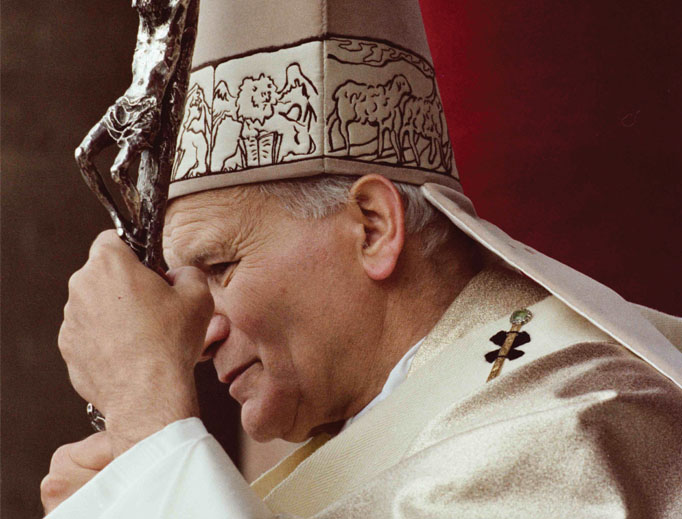(Here is Pope Saint John Paul II’s first homily for the feast of the Visitation, to close off his first Marian month as Pope, in 1979. It was a different era, but his words speak to our time – John Paul was the the Pope chosen to lead us into the third millennium, and to guide our way to Christ in these turbulent times, we have Our Lady, who will hasten to visit each one of us).
CONCLUSION OF THE MARIAN MONTH
HOMILY OF HIS HOLINESS JOHN PAUL II
31 May 1979
“And blessed is she who believed that there would be a fulfilment of what was spoken to her from the Lord” (Lk 1:45).
1: With this greeting, the elderly Elizabeth exalts her young kinswoman Mary, who has come, humble and modest, to help her. Under the impulse of the Holy Spirit, the mother of the Baptist is the first in the history of the Church to begin to proclaim the marvels that God has brought about in the girl from Nazareth, and sees fully realized in Mary the bliss of faith, because she has believed there would be a fulfilment of what was spoken to her from the Lord.
At the close of the Marian month, in this splendid Roman evening, at this place which reminds us of the Lourdes grotto, we must reflect, beloved Sisters and. Brothers, on what was the fundamental interior attitude of the Blessed Virgin with regard to God: her faith. Mary believed! She believed in the Lord’s words, transmitted to her by the Angel Gabriel; at the Annunciation, her pure heart, already given entirely to God from her childhood, dilated in the generous and unconditional “Fiat” with which she agreed to become the Mother of the Messiah and Son of God. From that moment, taking her place more and more deeply in God’s plan, she will let herself by led by the hand by mysterious Providence and for her whole life, rooted in faith, she will follow her Son spiritually, becoming his first and perfect “disciple” and carry-out in everyday life the requirements involved in following Jesus according to his own words: “Whoever does not bear his own cross and come after me, cannot be my disciple” (Lk 14:27).
Thus Mary will advance throughout her life in her “pilgrimage of faith” (cf. Dogmatic Constitution Lumen Gentium, 58), while her beloved Son, misunderstood, slandered, condemned, crucified, will mark out for her, day after day, a painful way, the necessary premise for that glorification, sung in the “Magnificat”: “all generations will call me blessed” (Lk 1:48). But first Mary, too, will have to go up to Calvary to be present, in sorrow, at the death of her Jesus.
2. Today’s feast of the Visitation presents to us another aspect of Mary’s inner life: her attitude of humble service and disinterested love for those in need. She has just heard from the Angel Gabriel of the state of her kinswoman Elizabeth, and at once she sets out for the hills “in haste” to reach a city of Judah, the present-day “Ain Karem”. The meeting of the two Mothers is also the meeting between the Forerunner and the Messiah, who, through his Mother, begins to operate salvation by making John the Baptist leap with joy when still in his mother’s womb.
(To continue reading, please see here)











